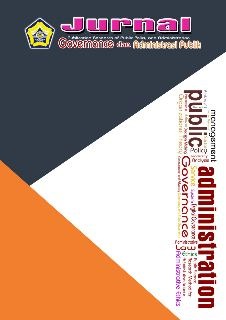Main Article Content
Abstract
Keywords
Article Details
Copyright :
Authors who publish their manuscripts in this Journal agree to the following conditions:
Copyright in each article is the property of the author.
The author acknowledges that Journal of Governance and Public Administration has the right to publish for the first time with a Creative Commons Attribution 4.0 International License.
The author can enter the writing separately, regulate the non-exculsive distribution of manuscripts that have been published in this journal into other versions (for example: sent to the author's institution respository, publication into books, etc.), by acknowledging that the manuscript was first published in the Journal Governance and Public Administration;
Licence :
The Journal of Governance and Public Administration is published under the terms of the Creative Commons Attribution 4.0 International License. This license allows anyone to copy and redistribute this material in any form or format, compose, modify, and make derivatives of this material for any purpose, including commercial interests, as long as they attach credit to the Author for the original creation.
References
- Bryman, Alan dan Robert G. Burgress. 1999. Qualitative Research. Great Britain. SAGE Publications Ltd. Perspective Concepts and Cases. New Jersey. Pearson Education International.
- Casley, Kumar dan Krishna Kumar. 1991. Pemantauan dan Evaluasi Proyek Pertanian. Jakarta. Penerbit Universitas Indonesia
- Cheema, G. Shabbir. 1981. Institutional Dimensions of Regional Development. Japan. Maruzen Asia
- Creswell, John W. 2002. Research Design: Qualitative and Quantitative Approaches. Jakarta. KIK Press.
- David, Fred R. 2001. Strategic Management: Concepts and Cases 8th edition. New Jersey. Prentice Hall
- Fischer, Frank & Gerald J. Miller dan Mara S. Sidney. 2007. Handbook of Public Policy Analysis: Theory, Politics, and Methods. United States of America. Taylor and Francis Group.
- Huda, Ni’matul. 2007. Pengawasan Pusat terhadap Daerah dalam Penyelenggaraan Pemerintahan Daerah. Yogyakarta. FH UII Press
- Husnan, Suad dan Suwarsono Muhammad. 2000. Studi Kelayakan Proyek. Yogyakarta. Unit Penerbit dan Percetakan UPP AMP YKPN
- Hutabarat, Jemsly dan Martani Huseini. 2006. Strategik di Tengah Operasional. Jakarta. PT. Elex Media Computindo.
- Inayatullah, dan Kuldeep Mathur. 1980. Monitoring and Evaluation of Rural Development: Some Asian Experiences. Malaysia. Asian and Pacific Development Administration Centre.
- Kim, B. S., Atkinson, D. R., & Yang, P. H. (1999). The Asian Values Scale : Development, Factor Analysis, Validation, and Reliability. Journal of Counseling Psychology, 46(3), 342-352.
- Koentjaraningrat. 1990. Metode-metode Penelitian Masyarakat. Jakarta: Gramedia Pustaka Utama
- Kusek, Jody Zall dan Ray C.Rist. 2004. Ten Steps to a Results-Based Monitoring and Evaluation System. Washington DC. The World Bank
- McGill, Ronald. 1996. Institutional Development: A Third World Management Perspective. London. MacMillan Press LTD.
- M.S., Joko Widodo. 2006. Analisis Kebijakan Publik. Malang. Bayu Media Publishing.
- Muhammad, Farouk dan H. Djaali. 2005. Metode Penelitian Sosial. Jakarta: PTIK Press dan Restu Agung.
- Nazir, Mohammad. 1983. Metode Penelitian. Jakarta. Ghalia Indonesia.
- Neuman, Lawrence R. 2003. Social Research Methods: Qualitative and Quantitative Approaches. United States of America. Pearson Education.
- Prasojo, Eko, dan Irfan R. Maksum dan Teguh Kurniawan. 2006. Desentralisasi & Pemerintahan Daerah: Antara Model Demokrasi Lokal & Efisiensi Struktural. Depok. Departemen Ilmu Administrasi Universitas Indonesia.
- Peters, B. Guy. 2000. Institutional Theory in Political Science. London and New York. Continuum.
- Royse, David et.al. 2006. Program Evaluation: An Introduction 4th ed. United States of America. The Thomson Brooks Corporation.
- Tambunan, T.TH.. 2012. Perekonomian Indonesia. Penerbit Ghalia Indonesia: Bogor.
- Todaro, Michael, P., dan Smith, Stephen, C 2006. Pembangunan Ekonomi.
- Jilid 1. Edisi 8. Penerbit Erlangga: Jakarta.
References
Bryman, Alan dan Robert G. Burgress. 1999. Qualitative Research. Great Britain. SAGE Publications Ltd. Perspective Concepts and Cases. New Jersey. Pearson Education International.
Casley, Kumar dan Krishna Kumar. 1991. Pemantauan dan Evaluasi Proyek Pertanian. Jakarta. Penerbit Universitas Indonesia
Cheema, G. Shabbir. 1981. Institutional Dimensions of Regional Development. Japan. Maruzen Asia
Creswell, John W. 2002. Research Design: Qualitative and Quantitative Approaches. Jakarta. KIK Press.
David, Fred R. 2001. Strategic Management: Concepts and Cases 8th edition. New Jersey. Prentice Hall
Fischer, Frank & Gerald J. Miller dan Mara S. Sidney. 2007. Handbook of Public Policy Analysis: Theory, Politics, and Methods. United States of America. Taylor and Francis Group.
Huda, Ni’matul. 2007. Pengawasan Pusat terhadap Daerah dalam Penyelenggaraan Pemerintahan Daerah. Yogyakarta. FH UII Press
Husnan, Suad dan Suwarsono Muhammad. 2000. Studi Kelayakan Proyek. Yogyakarta. Unit Penerbit dan Percetakan UPP AMP YKPN
Hutabarat, Jemsly dan Martani Huseini. 2006. Strategik di Tengah Operasional. Jakarta. PT. Elex Media Computindo.
Inayatullah, dan Kuldeep Mathur. 1980. Monitoring and Evaluation of Rural Development: Some Asian Experiences. Malaysia. Asian and Pacific Development Administration Centre.
Kim, B. S., Atkinson, D. R., & Yang, P. H. (1999). The Asian Values Scale : Development, Factor Analysis, Validation, and Reliability. Journal of Counseling Psychology, 46(3), 342-352.
Koentjaraningrat. 1990. Metode-metode Penelitian Masyarakat. Jakarta: Gramedia Pustaka Utama
Kusek, Jody Zall dan Ray C.Rist. 2004. Ten Steps to a Results-Based Monitoring and Evaluation System. Washington DC. The World Bank
McGill, Ronald. 1996. Institutional Development: A Third World Management Perspective. London. MacMillan Press LTD.
M.S., Joko Widodo. 2006. Analisis Kebijakan Publik. Malang. Bayu Media Publishing.
Muhammad, Farouk dan H. Djaali. 2005. Metode Penelitian Sosial. Jakarta: PTIK Press dan Restu Agung.
Nazir, Mohammad. 1983. Metode Penelitian. Jakarta. Ghalia Indonesia.
Neuman, Lawrence R. 2003. Social Research Methods: Qualitative and Quantitative Approaches. United States of America. Pearson Education.
Prasojo, Eko, dan Irfan R. Maksum dan Teguh Kurniawan. 2006. Desentralisasi & Pemerintahan Daerah: Antara Model Demokrasi Lokal & Efisiensi Struktural. Depok. Departemen Ilmu Administrasi Universitas Indonesia.
Peters, B. Guy. 2000. Institutional Theory in Political Science. London and New York. Continuum.
Royse, David et.al. 2006. Program Evaluation: An Introduction 4th ed. United States of America. The Thomson Brooks Corporation.
Tambunan, T.TH.. 2012. Perekonomian Indonesia. Penerbit Ghalia Indonesia: Bogor.
Todaro, Michael, P., dan Smith, Stephen, C 2006. Pembangunan Ekonomi.
Jilid 1. Edisi 8. Penerbit Erlangga: Jakarta.
